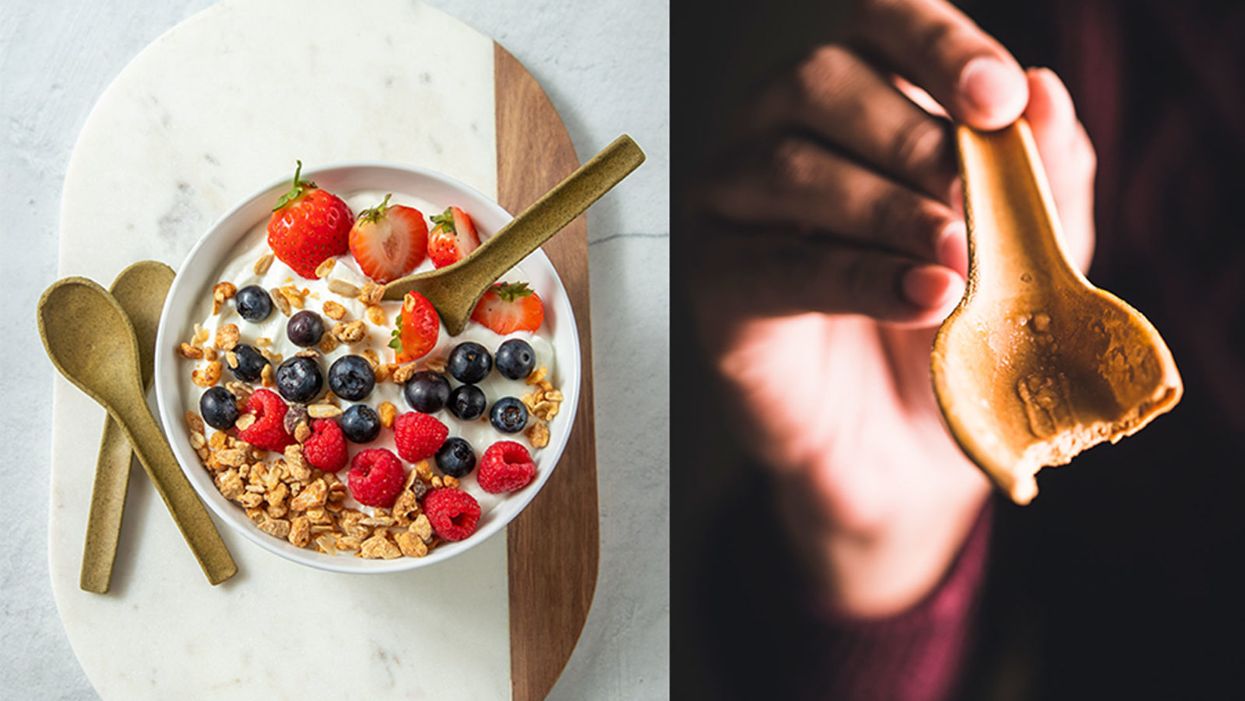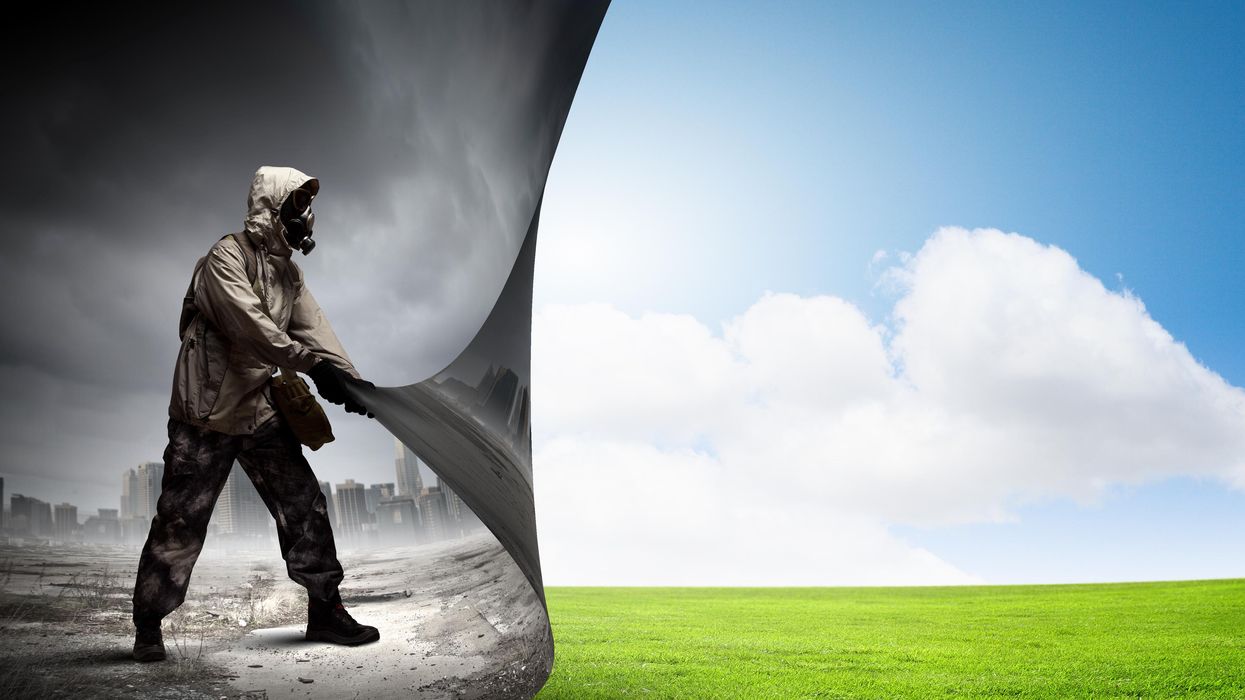Edible Silverware Is the Next Big Thing in Sustainable Eating

A new edible spoon is durable enough for mass market assembly and is already alleviating consumer waste.
Sure, you may bring a reusable straw when you go out to eat. But what about digesting your silverware at the restaurant? The future is already here.
Edible cutlery feels like a natural progression post-reusable straw.
Air New Zealand just added the new edible coffee cup Twiice into their in-flight service. Made from vanilla, wheat flower, sugar, egg and vanilla essence, the Twiice cups will be standard issue for the international airline.
On the ground, the new, award-winning startup IncrEDIBLESpoon has shipped more than a quarter million edible scoopers. The spoons are all-natural, vegan, and made from wheat, oat, corn, chickpea and barley.
The technological breakthrough is in creating tasty, mass-market material durable enough for delivery in an assembly line environment like airplane service, as well as stable enough to hold a hot cup of coffee or a freezing scoop of ice cream. Twiice cups can last several hours after hot coffee is added, while IncrEDIBLESpoon cutlery holds up to 45 minutes.
"We already caught the interest of a couple major ice cream chains," says Dinesh Tadepalli, co-founder of the IncrEDIBLESpoon parent company Planeteer. "If all goes well, one of them will test out our spoons at their scoop shop early this year."
Next Up
Edible cutlery feels like a natural progression post-reusable straw. And more is already on the menu.
The coffee cup company Twiice is already planning on expanding. Co-founder Jamie Cashmore says other serving items are coming later this year.
IncrEDIBLESpoon is also getting into more utensils. "We plan to mass produce the complete set by year's end: Edible straws, edible forks and edible coffee stirrers," Tadepalli says.
Most notably, Twiice's partner Air New Zealand sees the coffee cup as just a start to other sustainable solutions. The airline estimates it currently serves eight million cups of coffee annually. It's even suggesting customers bring their own reusable cup to the plane – though that isn't as ergonomic nor as attractive as eating everything you are served.
Open Questions
Making everything edible has a few challenges. First is cultural acceptance: With respect to current success, changing eating habits will require going beyond eco-focused and curious eaters.
Second, it's unclear if the short-term economics will add up in favor of airline carriers and other companies. Like alternative fuel, organizations will be more likely to adopt new science when it doesn't require a retrofitting or expensive change to their current business model – even if it does create long-term benefits.
The changes will likely be lopsided, influencing cultures at different times. Airplanes are a great start, as passengers are a captive audience interested in removing waste as soon as possible.
"Imagine eating a black pepper spoon after your soup or a chocolate spoon after your ice cream?"
We can expect edible cutlery to make an easier impact with certain cultures or foods. For instance, injera, the spongy Ethiopian bread, has served as an African plate of sorts for years. It makes sense that IncrEDIBLESpoon's four flavors, Salt, Masala, Spinach and Root, all fit in another bread-as-plate friendly culture: Indian.
Coffee and desserts sound like a good bet for now, though, especially for foodies. "People are curious to try edible spoons as they never heard or experienced them before," Tadepalli says. "Imagine eating a black pepper spoon after your soup or a chocolate spoon after your ice cream?"
You won't score many glamor points for using a neti pot, but it could be a worthwhile asset in fighting Covid-19, according to the author's experience and recent research.
Twice a day, morning and night, I use a neti pot to send a warm saltwater solution coursing through one nostril and out the other to flush out debris and pathogens. I started many years ago because of sinus congestion and infections and it has greatly reduced those problems. Along with vaccination when it became available, it seems to have helped with protecting me from developing Covid-19 symptoms despite being of an age and weight that puts me squarely at risk.
Now that supposition of protection has been backed up with evidence from a solidly designed randomized clinical trial. It found that irrigating your sinuses twice a day with a simple saltwater solution can lead to an 8.5-fold reduction in hospitalization from Covid-19. The study is another example of recent research that points to easy and inexpensive ways to help protect yourself and help control the epidemic.
Amy Baxter, the physician researcher behind the study at Augusta University, Medical College of Georgia, began the study in 2020, before a vaccine or monoclonal antibodies became available to counter the virus. She wanted to be able to offer another line of defense for people with limited access to healthcare.
The nasal cavity is the front door that the SARS-CoV-2 virus typically uses to enter the body, latching on to the ACE2 receptors on cells lining those tissue compartments to establish infection. Once the virus replicates here, infection spreads into the lungs and often other parts of the body, including the brain and gut. Some studies have shown that a mouthwash could reduce the viral load, but any effect on disease progression was less clear. Baxter reasoned that reducing the amount of virus in the nose might give the immune system a better chance to react and control that growth before it got out of hand.
She decided to test this approach in patients who had just tested positive for Covid-19, were over 55 years of age, and often had other risk factors for developing serious symptoms. It was the quickest and easiest way to get results. A traditional prevention study would have required many more volunteers, taken a longer period of follow up, and cost money she did not have.
The trial enrolled 79 participants within 24 hours of testing positive for Covid-19, and they agreed to follow the regimen of twice daily nasal irrigation. They were followed for 28 days. One patient was hospitalized; a 1.27% rate compared with 11% in a national sample control group of similar age people who tested positive for Covid-19. Patients who strictly adhered to nasal irrigation had fewer, shorter and less severe symptoms than people in the study who missed some of their saline rinses.
Baxter initially made the results of her clinical trial available as a preprint in the summer of 2021 and was dismayed when many of the comments were from anti-vaxxers who argued this was a reason why you did not need to get vaccinated. That was not her intent.
There are several mechanisms that explain why warm saltwater is so effective. First and most obvious is the physical force of the water that sweeps away debris just as a rainstorm sends trash into a street gutter and down a storm drain. It also lubricates the cilia, small hair-like structures whose job it is to move detritus away from cells for expulsion. Cilia are rich in ACE2 receptors and keeping them moving makes it harder for the virus to latch on to the receptors.
It turns out the saline has a direct effect on the virus itself. SARS-CoV-2 becomes activated when an enzyme called furin snips off part of its molecular structure, which allows the virus to grab on to the ACE2 receptor, but saline inhibits this process. Once inside a cell the virus replicates best in a low salt environment, but nasal cells absorb salt from the irrigation, which further slows viral replication, says Baxter.
Finally, “salt improves the jellification of liquid, it makes better and stickier mucus so that you can get those virus out,” she explains, lamenting, “Nobody cares about snot. I do now.”
She initially made the results of her clinical trial available as a preprint in the summer of 2021 and was dismayed when many of the comments were from anti-vaxxers who argued this was a reason why you did not need to get vaccinated. That was not her intent. Two journals rejected the paper, and Baxter believes getting caught up in the polarizing politics of Covid-19 was an important part of the reason why. She says that editors “didn't want to be associated with something that was being used by anti-vaxxers.” She strongly supports vaccination but realizes that additional and alternative approaches also are needed.
Premeasured packets of saline are inexpensive and can be purchased at any drug store. They are safe to use several times a day. Say you’re vaccinated but were in a situation where you fear you might have been exposed to SARS-CoV-2; an extra irrigation will clear out your sinuses and may reduce the risk of that possible exposure.
Baxter plans no further study in this area. She is returning to her primary research focus, which is pain control and reducing opioid use, but she hopes that others will expand on what she had done.
Podcast: The Friday Five Weekly Roundup in Health Research
In this week's Friday Five: progress on a pill to prevent lung cancer. Plus, ancient wisdom about Neti pots could pay off against Covid, a breakthrough for precision medicine and obesity, the connection between taking a multivitamin pill and brain health - and much more.
The Friday Five covers five stories in research that you may have missed this week. There are plenty of controversies and troubling ethical issues in science – and we get into many of them in our online magazine – but this news roundup focuses on scientific creativity and progress to give you a therapeutic dose of inspiration headed into the weekend.
Listen on Apple | Listen on Spotify | Listen on Stitcher | Listen on Amazon | Listen on Google
Here are the promising studies covered in this week's Friday Five:
- A pill to prevent lung cancer?
- Ancient wisdom about Neti pots could pay off for Covid
- Breakthrough for precision medicine and obesity
- How to refreeze the north and south poles
- The connection between taking multivitamin pills and brain health

